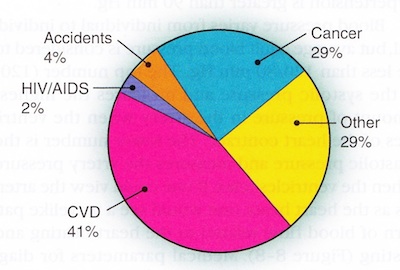Home > Building Background Knowledge
The term cardiovascular disease refers to the class of diseases that involves the heart (cardio) or blood vessels (vascular), both arteries and veins. While the term technically refers to any disease affecting the cardiovascular system, it more commonly refers to those diseases caused by atherosclerosis. Atherosclerosis occurs when fatty material and other substances form a plaque build-up on the walls of your arteries. The build-up causes the arteries to narrow. As the coronary arteries (arteries going to the heart) narrow, blood flow to the heart can slow down or stop. The decrease in blood flow can cause chest pain, shortness of breath, heart attack, and other ailments.
Source: The description of atherosclerosis is adapted from this government web site
Studies have shown that many people worry about the things that are less likely to harm them while ignoring real risk factors. Some heavy smokers, for instance, worry more about flying in a plane than they do about the cigarettes they put in their mouths. A similar situation exists where heart disease is concerned. Heart disease is a major killer. But it's not the disease most people worry about. That disease would be cancer. Yet the figures don't lie. We are more likely to die of cardiovascular disease (CVD) than we are of cancer.

The source of the pie chart is Neighbors and Tannenhill-Jones Human Diseases , p.133
Committed to promoting awareness that heart disease is a serious threat to our health, Millie Bruce, from Banffshire, Scotland, took the time to write up the five myths that all too often prevent us from getting the medical attention we need to keep our heart healthy.
Millie Bruce can be reached on twitter.
| Myth 1. Mainly older people need to be concerned about their heart. | Reality Check. The bad habits—poor diet, lack of exercise, smoking—that pave the way for heart disease start young, so it pays to be concerned about heart health early on in life. Consider too that the American Stroke Conference, in 2011, reported a stunning and disturbing increase in strokes among people aged 15 to 34. No matter how young and fit you are, you still need to check your cholesterol and blood pressure. The best blood cholesterol (or lipid profile) amount is under 200. A good blood pressure is 120/80. |
| Myth 2. I'd feel ill if I had high blood pressure or high cholesterol levels. | Reality Check. High blood pressure and high cholesterol levels are called "silent killers" for a reason. They show NO warning signs. One-third of all mature people, for instance, have high blood pressure. One-third of them do not know their blood pressure is at an above normal level. |
| Myth 3.When it comes to heart attacks, pain in the chest is the only symptom to be concerned about. | Reality Check. Women and men CAN have the same signs, but they commonly do not. Ladies seem to get the subtler warning signs though males more frequently have the form of cardiac arrest you see in the movies, where a man keels over clutching his chest. When the subtler warning signs occur— jaw achiness, nausea, vomiting, breathlessness and excessively low energy—both men and women are inclined to explain them away, e.g. "My jaw must hurt from the whole-grain bread I had to chew so hard at lunchtime." Both men and women can experience the "grab-your-chest-and-fall-down-gasping" form of heart attack, but now you know, pain in the chest is far from the only symptom. |
| Myth 4. Diabetics who keep their sugar level in check don't have an increased risk of heart disease. | Reality Check. Although keeping blood sugar levels within a normal range (80ml-120ml) helps keep diabetics healthier and stronger, just having the additional blood sugar in their system takes its toll on arteries, making frequent blood pressure and blood cholesterol checks a must. |
| Myth 5. My health practitioner would order exams if I were vulnerable to heart problems. | Reality Check. Many people don't inform their doctor about the little pains they feel. They figure if anything is really wrong, the doctor will find it. Not fully informed about their patients' symptoms, doctors don't order the heart checks that might well be necessary. If you are getting a check-up and keeping mum about how you have been feeling a little tired and get out of breath when you go up the stairs, keep the following in mind: "Mammograms and Colonoscopies are routinely recommended," says Merdod Ghafouri, a cardiologist at Inova Fairfax Clinic in Va, "and are necessary, but heart tests aren't routinely executed." Your symptoms might well be a sign of heart disease. But unless you tell your doctor about them, he can't be expected to order the appropriate tests. |
Last change made to this page: May 25, 2011